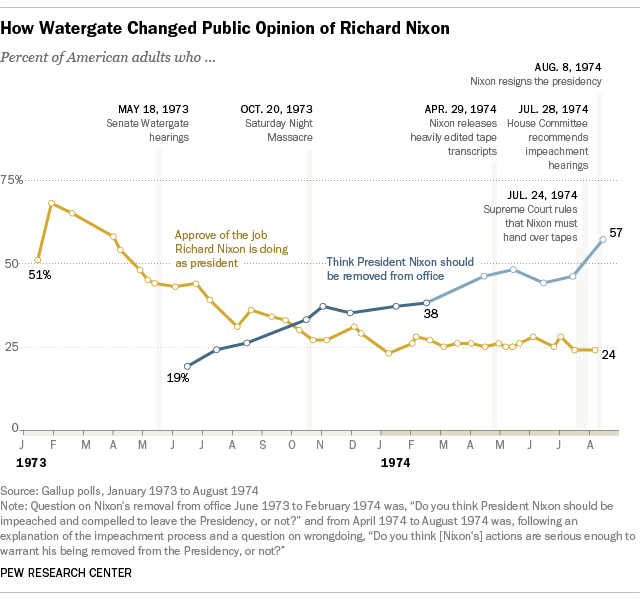...there was the reelection.
However, there was a shift in opposition when events moved beyond the investigative stage.

Forty years ago today, Richard Nixon announced his resignation from the nation’s highest office, making that decision in the face of almost certain impeachment by the House and plummeting public support, as a majority of Americans called for his removal from office. But it happened in stages.
Nixon had won reelection in 1972 by a landslide and began his second term with a lofty 68% Gallup Poll approval rating in January 1973. But the Watergate scandal — which started with an effort to bug the Democratic National Committee office at the Watergate Hotel and subsequent efforts to cover it up — quickly took a heavy toll on those ratings, especially when coupled with a ramp-up in public concerns about inflation. By April, a resounding 83% of the American public had heard or read about Watergate, as the president accepted the resignations of his top aides John Ehrlichman and H.R. Haldeman. And in turn, Nixon’s approval ratings fell to 48%.
But that was just the beginning of the toll the scandal would take on the president that year. The televised Watergate hearings that began in May 1973, chaired by Senator Samuel Ervin, commanded a large national audience — 71% told Gallup they watched the hearings live. And as many as 21% reported watching 10 hours or more of the Ervin proceedings. Not too surprisingly, Nixon’s popularity took a severe hit. His ratings fell as low as 31%, in Gallup’s early August survey.
The public had changed its view of the scandal. A 53% majority came to the view that Watergate was a serious matter, not just politics, up from 31% who believed that before the hearings. Indeed, an overwhelming percentage of the public (71%) had come to see Nixon as culpable in the wrongdoing, at least to some extent. About four-in-ten (37%) thought he found out about the bugging and tried to cover it up; 29% went further in saying that he knew about the bugging beforehand, but did not plan it; and 8% went all the way, saying he planned it from beginning to end. Only 15% of Americans thought that the president had no prior knowledge and spoke up as soon as he learned of it.
Yet, despite the increasingly negative views of Nixon at that time, most Americans continued to reject the notion that Nixon should leave office, according to Gallup. Just 26% thought he should be impeached and forced to resign, while 61% did not.
more: http://www.pewresearch.org/fact-tank/2014/08/08/how-the-watergate-crisis-eroded-public-support-for-richard-nixon/
 = new reply since forum marked as read
= new reply since forum marked as read
